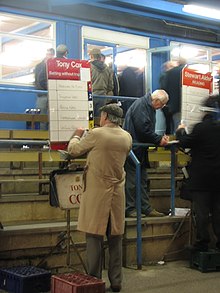Bookmaker
A bookmaker (English bookmaker or bookie for short ) offers bets with fixed or variable odds on the outcome of future events, particularly sporting events. This game of chance is particularly widespread in horse races , soccer , ice hockey or basketball games , and traditionally in England at almost all public events.
As a betting provider, the bookmaker guarantees with his name that winnings will be paid out at the odds and stakes in his book . Since, in the digital age, the majority of bets can be placed more quickly via providers on the Internet, the traditional acceptance points are becoming less important.
This activity can be legal or illegal (“black bookmaker”). In Germany , a bookmaker needs an official permit to legally accept bets (“licensed bookmaker” exclusively for horse racing). Currently, many bookmakers or bookmaking firms are based in tax havens or in countries with a liberal gambling tradition such as the United Kingdom of Great Britain and Northern Ireland , Gibraltar or Malta . The legal assessment of bookmakers who broker sports betting on the Internet across national borders is in a gray area. The international enforcement of legal claims is practically disproportionate to the damage claimed.
The bookmaker must be distinguished from the totaliser, who arranges bets via totaliser , but does not appear as a betting opponent.
To math
The bookmaker offers, for example, fixed odds for a win, a draw or a loss for team sport events. A quota indicates the relationship between the stake and the possible profit: for example "pay 2.50 for a stake of 1 euro". The bookmakers can change variable odds at any time. However, completed bets retain the agreed odds that were valid when the bet was made.
The multiplication of the odds with the stake results in the possible profit.
The bookmaker may take great risks because he is trading with probabilities and often large bets. To limit the risk, bookmakers offer bets on all possible outcomes, so ideally they make their profit through arbitrage . In order to avoid the high risk of loss in the event of unbalanced bets, the bookmaker can limit the amount of the bets, for example, or reinsure himself on international betting exchanges . As a rule, the bookmaker runs an extremely profitable business.
The bookmaker has an advantage over the bettor, as he does not have to predict the correct result in order to win. Its task is to correctly estimate the percentage of bets for the various outcomes and to calculate the odds based on this. By looking into his "books", the bookmaker can constantly see how the bets made are distributed in percentage terms. He can adjust the odds at any time. Similar to election extrapolations, with very small samples he then comes to very precise statements regarding the betting predictions of the bettors. Large bookmaking companies work with extensive statistical material and methods.
With "fair odds" the bookmaker would have to pay out all the losers' money to the winners. Of course, the real odds are lower, which is what makes the bookmakers profit: the bookmaker's margin. The “counterpart” to this - the payout ratio - is between 50% and 60% for the German ODDSET . With many other (especially private) bookmakers, payout rates of over 90% are not uncommon. The payout quota can be calculated based on the offered odds, assuming that it is the same for every outcome. To this end, the reciprocal values of the odds are added. The payout rate is the reciprocal of this sum ( harmonic mean ), for example 1 for a payout of 100%. In a 2-way bet, two equal players are offered a win rate of 1.95 for both. 1 / 1.95 + 1 / 1.95 = 0.5128 + 0.5128 = 1.02564 → 1 / 1.02564 = 0.975 = 97.5%. This means that there is a very low bookmaker margin of 2.5% in these odds. If only 1.80 is offered for both players, this means a margin of 10%.
Online bookmaker
Since the turn of the millennium and the rapid development of the Internet , a large number of online bookmakers who offer their services globally have established themselves. Customers can register on the online bookmaker's website and then place their bets online. Normally, money is transferred via the usual internet channels such as e-wallets , credit cards and bank transfers . In order to position themselves against the competition (the number of sports betting providers operating on the Internet has long since exceeded 100), the online bookmakers advertise their offers with various bonus and cashback programs . Especially at the EM 2012 you could see more advertisements for online bookmakers on German-language television (both private and public).
Bookmaker and odds comparison
Since the betting industry has shifted more and more to the Internet, a completely new industry has emerged with the odds comparison of betting odds. As a result, sports bettors nowadays have the opportunity to research the betting provider with the best odds from dozens of bookmakers for events on which they want to place bets within just a few seconds. Furthermore, it has also become very easy to compare the basic conditions and terms and conditions as well as bonus conditions of the bookmakers with each other. Neutral reviews by the existing customers of various bookmakers can also help users to get an objective picture of a betting provider before registering with them. A bookmaker and odds comparison is therefore very welcome in terms of consumer protection .
Web links
- Bet and lottery taker in the profession of the Federal Employment Agency
- This is how a bookmaker works on Konsumguerilla.net
- This is how odds comparisons work on oddspedia.com

